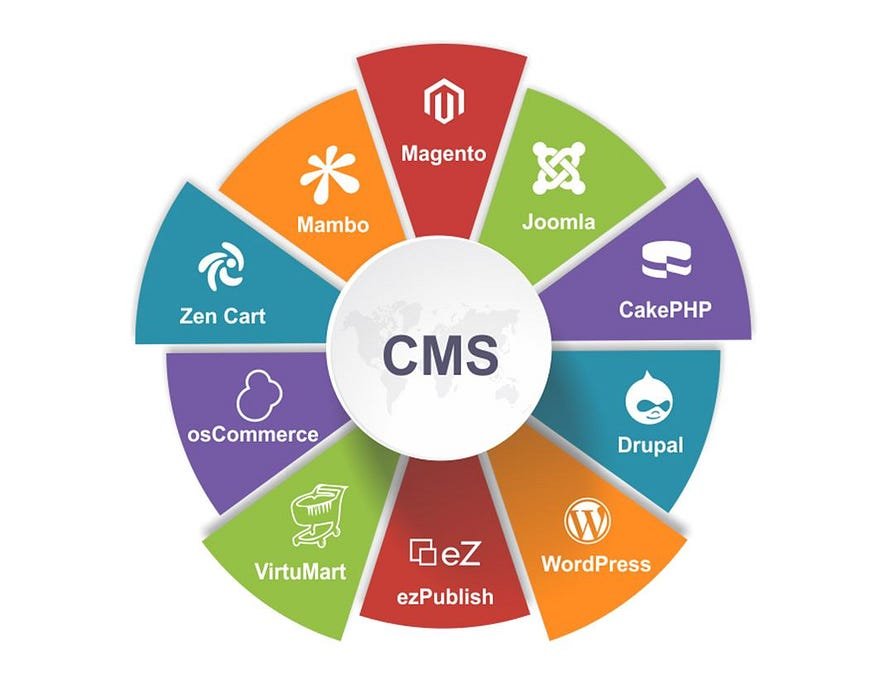The Purpose Of A Content Management System and How To Use It?
We believe you have heard about CMS, but if you don’t know much more apart of this abbreviation, then better read this post.

Life Without CMS
In the past, the process of creating a relatively simple website could be quite laborious and complicated, even for websites with minimum requirements for visual appearance, navigational structure, and variety of content.
The programmers had to develop from the scratch the web pages, the website and the CMS for the website, leaving the following management task in the hands of the end user or the owner of the site.
For this process of website building, the software developers had to work with several technologies, mainly HTML, JavaScript, and CSS, to build even a relatively simple static website. In case of more complex tasks, such as the development of dynamic websites, then other programming languages and coding technologies such as ASP, JSP or PHP to name a few of the best known were required.
Once the process of building a website was completed, and the site was published online, updating its content also became a difficult task, especially as the website grew.
Essential tasks, such as modifying existing content, searching and locating pages and, in general, managing both the pages and images and resources on the server, required custom tools or developments, which increased the complexity of the website and its cost respectively.

The Content Management System is a Solution
A user-friendly tool was required to allow the following:
1) Creation of a website without the need to continually resort to advanced technical resources;
2)Management, administration, and maintenance of the website over time within an integrated environment and without resorting to other external tools. Content management systems or content managers have emerged to respond to these needs.
What is a CMS?
CMS is an acronym for a Content Management System. A CMS is software developed so that any user can manage and manage content on a website quickly and without knowledge of Web programming.
What The CMS does?
Every Content Management System serves for 3 primary functions:
1)To Facilitate the Creation of the website.
2)To Handle the Management and maintenance of the website.
3)To Provide the Administration of the website and the CMS itself.
These three are not the only functions that a CMS can perform, but without any of them, we could not consider it as a pure content manager. The CMS’s for more advanced, or specialized for some specific activity might have additional functions, required for the specific needs of such type of sites.
For example, a catalog of products in an eCommerce store.
A fundamental characteristic of the CMS’s is the possibility of installing plugins, which allow the addition of new functions not contemplated or initially supported by the CMS to create more complex or varied websites.
What Are The Main Advantages of a CMS?
Here are listed some of the most important advantages of using a CMS:
- Quick development of a site without technical assistance;
- Provides people with little or no technical skills the ability to create, update or modify content-i.e. users can quickly add and edit pages, or add functionalities on their sites ;
- Easy to find help and resources;
- Easy maintenance and updates of websites;
- Reduced costs for maintenance and tech assistance, compared to custom-made solutions.
Who needs CMS?
The CMS might be a good solution when:
1)The content has to be published in multiple languages or localization is necessary;
2)A search utility or API for the site is required;
3)The same content has to be used over and over again in one publication;
4)The same published content has to be used in more than one document;
5)When an approval workflow is required in case the site is maintained by more than one administrator or have an editorial team ;
6)The content has to be published to more than one media channel;
7)The content of the website includes regular posts like blogs or press releases, which can also be in series;
8)The management is of the website is delegated to a limited number of people, and the process of maintaining the website content is challenging;
9)The budget used for website management, or maintenance of the site has to be reduced or improved;
For what type of websites you should use CMS?
At this point, I can say a few words about What types are the CMS?
Not all websites are the same, and for this, we also have different types of Content Management Systems, depending on the type of websites.
For example, there are CMS for blogs, corporate pages, real estate, online stores, news or magazines, multimedia content, and so on.
To understand the power of content managers and get an idea of their versatility, here are some types of websites that we can build with the help of a commercial Web CMS, often without the need for specific adaptations.
Types of websites that usually use a CMS

Business or Company websites
Corporate websites usually have a reasonably standardized structure and management, entirely compatible with a Web CMS.
What is usually included in such a standard website is a homepage, product or service catalog, company information, company news, a company blog, portfolio, clients list, contact page and sometimes a private section for employees or clients, with can include a section for downloads.
E-commerce Platforms
The requirements of an Electronic Commerce(e-commerce) platform are higher than those for other platforms (i.e. Blogging platforms).
The content manager must allow quick and effective management of the product catalogue and customer portfolio, as well as advanced navigation and search tools that facilitate the user to locate products of interest to them.
The CMS for an e-Commerce platform must also include secure and robust online payment support, with an option the payment to be made on the site the website and with options for payment types.
Blogs and Blogs platforms
Blogs can be built as separate independent sites, not just as part of a website.
In addition to managing blog articles, the CMS provides features to facilitate its management by the user, such as the categorization of articles or configuration of its publication and properties and other resources such as images or downloads.
Online Training Platforms
For websites dedicated for online courses, the complexity of the CMS can be even more significant than the Content Management Systems for eCommerce platforms, since, in addition to a catalogue of courses, it must include tools for management, communication, and monitoring of students.
Users must have a private area, with everything necessary to carry out one or more courses: access to content, list of activities and exercises, tools for with tutors and other users, completion of exams, the organization of courses, statistics of use, sharing of resources among users or teachers, etcetera.
What are some examples of popular CMS?
There is no secret that WordPress is the most popular CMS in the world because of its advantages.
There are though many other content management systems which can be used instead of WordPress and I would like to mention only some of them because the list is quite long: Joomla, Drupal, ExpressionEngine, Magento, Blogger, Shopify, Bitrix, TYPO3, Squarespace, PrestaShop, and many others.

The End
The Content Management Systems offer through an integrated interface, various tools to create, manage a website and its content, as well as other functions that may be necessary for the website’s operation.
In many cases, for the creation and the management of a website is not necessary to have a team of qualified personnel thanks to content managers or CMS.
Read also about the Disadvantages of CMS.
